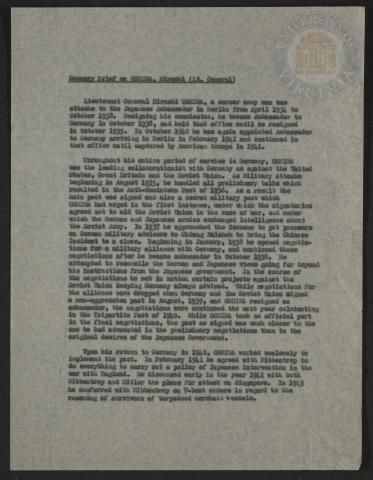
Page 1
| Parent | Summary Brief about Hiroshi Oshima |
|---|---|
| Date | |
| Language | English |
| Collection | Roy L. Morgan Papers |
| Box | Box 3 |
| Folder | 1946 [IMFTE] (IPS) Translations of interrogations. |
| Repository | University of Virginia Law Library |
Summary Brief on OSHIMA, Hiroshi (Lt. General)
Lieutenant General Hiroshi OSHIMA, a career army man was attaché to the Japanese Ambassador in Berlin from April 1934 to October 1938. Resigning his commission, he became Ambassador to Germany in October 1938, and held that office until he resigned in October 1939. In October 1940 he was again appointed Ambassador to Germany arriving in Berlin in February 1941 and continued in that office until captured by American troops in 1941.
Throughout his entire period of service in Germany, OSHIMA was the leading collaborationist with Germany as against the United States, Great Britain and the Soviet Union. As Military Attache beginning in August 1935, he handled all preliminary talks which resulted in the Anti-Comintern Pact of 1936. As a restful the main pact was signed and also a secret military pact which OSHIMA had urged in the first instance, under which the signatories agreed not to aid the Soviet Union in the case of war, and under which the German and Japanese armies exchanged intelligence about the Soviet Army. In 1937 he approached the Germans to put pressure on German military advisors to Chiang Kai-shek to bring the Chinese Incident to a close. Beginning in January, 1938 he opened negotiations for a military alliance with Germany, and continued these negotiations after he became ambassador in October 1938. He attempted to reconcile the German and Japanese views going far beyond his instructions from the Japanese government. In the course of the negotiations he set in motion certain projects against the Soviet Union keeping Germany always advised. While negotiations for the alliance were dropped when Germany and the Soviet Union signed a non-aggression pact in August, 1939, and OSHIMA resigned as ambassador, the negotiations were continued the next year culminating in the Tripartite Pact of 1940. While OSHIMA took no official part in the final negotiations, the pact as signed was much closer to the one he had advocated in the preliminary negotiations than to the original desires of the Japanese Government.
Upon his return to Germany in 1940, OSHIMA worked zealously to implement the pact. In February 1941 he agreed with Ribbentrop to do everything to carry out a policy of Japanese intervention in the war with England. He discussed early in the year 1941 with both Ribbentrop and Hitler the plans for attack on Singapore. In 1943 he conferred with Ribbentrop on U-boat orders in regard to the rescuing of survivors of torpedoed merchant vessels.
